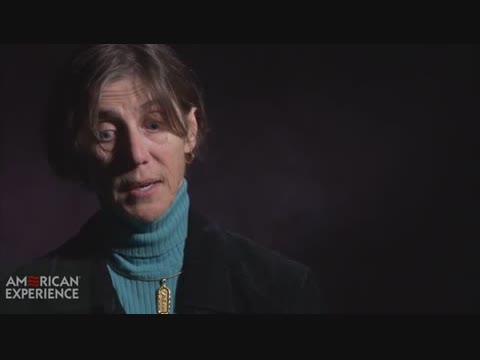American Experience; The Abolitionists; Interview with Julie Roy Jeffrey, part 4 of 5
- Series
- American Experience
- Episode
- The Abolitionists
- Raw Footage
- Interview with Julie Roy Jeffrey, part 4 of 5
- Contributing Organization
- WGBH (Boston, Massachusetts)
- AAPB ID
- cpb-aacip-15-qn5z60d37b
If you have more information about this item than what is given here, or if you have concerns about this record, we want to know! Contact us, indicating the AAPB ID (cpb-aacip-15-qn5z60d37b).
- Description
- Description
- Julie Roy Jeffrey is professor of American history at Goucher College and author of The Great Silent Army of Abolitionism: Ordinary Women in the Abolitionist Movement and Abolitionists Remember: The Second Battle Against Slavery.
- Topics
- Biography
- History
- Race and Ethnicity
- Subjects
- American history, African Americans, civil rights, racism, abolition
- Rights
- (c) 2013-2017 WGBH Educational Foundation
- Media type
- Moving Image
- Duration
- 00:29:43
- Credits
-
- AAPB Contributor Holdings
-
WGBH
Identifier: cpb-aacip-f53841279f9 (Filename)
Duration: 0:29:44
-
Identifier: cpb-aacip-86f25c2cdcf (unknown)
Format: video/mp4
Generation: Proxy
Duration: 00:29:43
If you have a copy of this asset and would like us to add it to our catalog, please contact us.
- Citations
- Chicago: “American Experience; The Abolitionists; Interview with Julie Roy Jeffrey, part 4 of 5,” WGBH, American Archive of Public Broadcasting (GBH and the Library of Congress), Boston, MA and Washington, DC, accessed February 28, 2026, http://americanarchive.org/catalog/cpb-aacip-15-qn5z60d37b.
- MLA: “American Experience; The Abolitionists; Interview with Julie Roy Jeffrey, part 4 of 5.” WGBH, American Archive of Public Broadcasting (GBH and the Library of Congress), Boston, MA and Washington, DC. Web. February 28, 2026. <http://americanarchive.org/catalog/cpb-aacip-15-qn5z60d37b>.
- APA: American Experience; The Abolitionists; Interview with Julie Roy Jeffrey, part 4 of 5. Boston, MA: WGBH, American Archive of Public Broadcasting (GBH and the Library of Congress), Boston, MA and Washington, DC. Retrieved from http://americanarchive.org/catalog/cpb-aacip-15-qn5z60d37b
